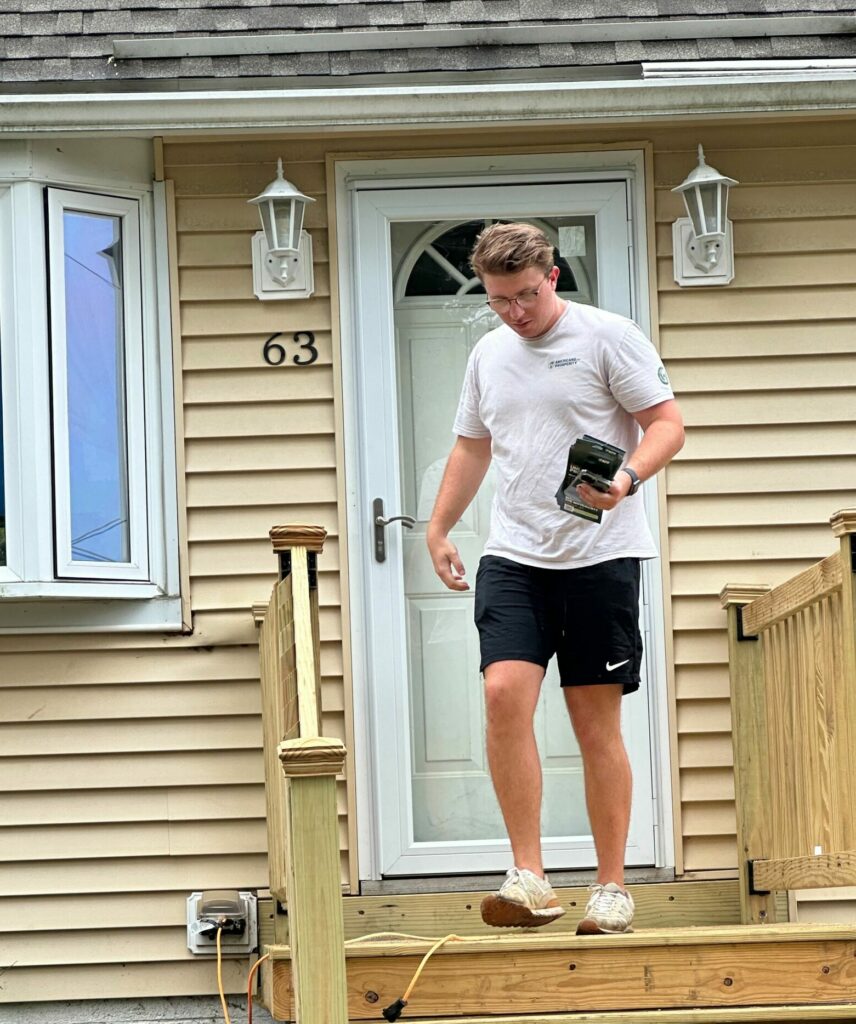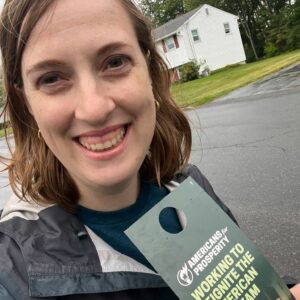Americans for Prosperity (AFP) Chief Executive Emily Seidel sent a memo in February to her staff and activists saying the free-market organization would get more directly involved in Republican primaries.
“Here’s the hard truth as I see it,” Seidel wrote. “The Republican Party is nominating bad candidates who are advocating for things that go against core American principles. And the American people are rejecting them.”
“The Democratic Party increasingly sees this as a political opportunity. And they’re responding with increasingly more extreme policies,” Seidel added. “This means the country is in a downward spiral, with both parties reinforcing the bad behavior of the other.”
Now the organization is putting its words into action on the streets of New Hampshire. AFP activists are talking to voters, gauging what issues are most important to them, and seeing where they stand on the candidates in the Republican presidential primary.

Ethan with AFP knocking doors in New Hampshire
In a recent interview with NHJournal, Seidel said the group’s focus is getting “better” candidates on the ballot.
“If we want to have a better policy-making environment after the November elections next year, we need better candidates on the ballot in the first place. And to get better candidates on the ballot, we need to start a lot earlier, and we need to be involved in more primaries from the top of the ticket all the way down to the bottom. To start to do that work, we’re talking to voters in places like New Hampshire.”
AFP intends to visit every New Hampshire municipality at least once in the lead-up to the primary.
To see this work up close, NHJournal joined AFP NH State Director Greg Moore and Deputy State Director Sarah Scott in Litchfield as they walked neighborhoods and knocked on doors.
Granite Staters are used to this, the state reinforcing its “All politics is local” reputation every four years when presidential candidates descend on the First-in-the-Nation primary state for house parties, town halls, visits to cafes and diners, and yes, door knocking.
“It’s really the bread-and-butter of politics,” Moore said. And with groups like AFP mobilizing, voters will get even more exposure to retail politics this cycle.
“We’re looking to have conversations with voters to understand where they are, figure out what issues are important to them, and where they stand as far as a presidential preference. Are they supporting former president Trump or looking at someone else?”
Specifically, AFP wants to talk to infrequent voters – those who, for whatever reason, don’t vote all the time – making it a point to understand what issues these voters care about most and whether they intend to vote in the state’s presidential primary.
Based on conversations with locals in Litchfield and feedback from AFP activists, the economy and inflation are still top issues for most voters. But AFP is also hearing a lot about immigration and foreign policy, too.
According to Moore, going door to door in every municipality in the state gives AFP a unique perspective about what issues matter most, allowing them to build a model that informs what AFP should focus on in their messaging. “It doesn’t do us any good to talk about issues that nobody cares about.”
The on-the-ground approach allows AFP to see what others can’t. “I think we saw a little bit of that in 2022 when Republicans just assumed everybody was caring about the economy, when in fact you had a dynamic in which there were a lot of people who were concerned about abortion, and Republicans just left that on the table,” said Moore. “We could see that there was a gap there.”
Moore believes they also have an inside look at how the upcoming Republican presidential primary is shaping up, as well. “We usually have better intel than most people about what’s actually going on on the ground just because we have literally thousands of data points,” Moore said. “For example, I can tell you that someone like Vivek Ramaswamy is starting to get some movement because we’re seeing the numbers move.”
Regarding the field of presidential candidates, both Moore and Scott said many voters tell them it’s too early to talk about the election and that most haven’t decided who they’re going to support. But the voters they spoke to during the Litchfield walk-through all said they plan to vote in the First-in-the-Nation primary.
Hearing what voters have to say about the candidates is particularly important for AFP, as Americans for Prosperity Action will eventually endorse a candidate for president later this year. These conversations now, especially with infrequent voters, will help guide AFP’s approach going forward.
“We’re trying to understand their mindset because, at the end of the day, when we do endorse somebody…we have to understand what it’s going to take to get them elected,” Moore said.
Walking up to a house during the walk-through with NHJournal, Moore had some advice for other political groups and campaigns this election season. “They need to get out and do this, to talk to real voters.”
“Too many people in politics live in a bubble, and when they actually get out and talk to people and realize that the stuff that they thought was important bears no resemblance to what the people out there care about, then it becomes a great opportunity to check back and connect yourself to what’s really going on.”





